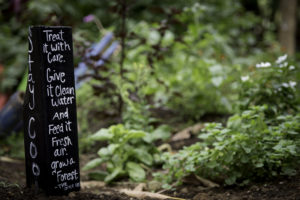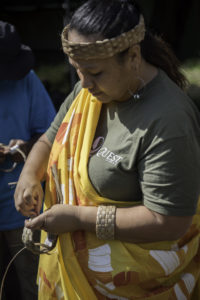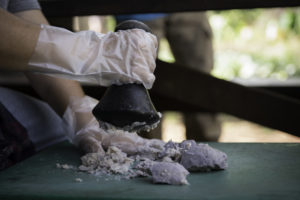By: Janna Pate, Academic Coordinator
Makahiki is a holiday season that marks the end and new beginning of the yearly farming cycle in Hawaii. It is similar in timing and purpose to Thanksgiving, Oktoberfest, and other harvest celebrations. At Pacific Quest, we celebrate Makahiki throughout the month of November.
Our celebrations culminate in a day of cultural lessons, including storytelling, games, crafts, chants, and dancing. At the end of it all, there is a Makahiki feast that we cook in a traditional Hawaiian imu, or underground oven.

Hand painted garden sign
During the days that lead up to our culminating celebration, students at Pacific Quest turn their attentions to harvesting fresh fruits, vegetables, and herbs from the garden. Some of this bounty goes toward our meal preparations for the Pacific Quest community, and some is donated to the local farmer’s market. During Makahiki season, Pacific Quest students make a special effort to donate to the farmer’s market in abundance. Our donations may include handmade bundles of fresh herbs, greens, or flowers; seedlings and shoots from our nursery; hand-painted gourds and garden signs; hand-picked avocados and citrus fruits from our fruiting trees; a wide-array of organic vegetables; and more.
Traditionally, once tributes like these were collected from around the island, communities gathered to celebrate Makahiki with feasts and games. Both men and women and everyone from chiefs to commoners competed. Pacific Quest students celebrate in a similar way. Throughout the month of November, we teach our students traditional Makahiki games. In ancient Hawaii, the main purpose of these games was to train warriors. As such, Makahiki games tend to focus on building strength, stamina, and agility. We focus on building those skills with our students as well by facilitating traditional Hawaiian games like ikaika (lifting of stones), moa pahe’e (sliding of wooden darts or, at Pacific Quest, lengths of bamboo), and foot races.
In addition to physical challenges, we also teach Makahiki games that challenge the mind. For example, we teach konane, or Hawaiian checkers. Traditionally, konane is played on a board with 64 playing pieces made of black lava stone and white coral. At Pacific Quest, we use black lava stone and red cinder from the paths of our gardens.

Traditional Hawaiian craft-making, Lauhala weaving
We teach traditional Hawaiian craft-making as well. One such practice is lauhala weaving, or weaving with the leaves of the hala tree. Lauhala weaving has been a part of Hawaiian culture for thousands of years. In ancient times, weavers transformed hala leaves into everything from floor mats to pillows and sails. At Pacific Quest, we teach our students how to craft lauhala bracelets and headbands using hala leaves from the trees in our camps.
We are also lucky enough to have staff who are trained in hula dancing and traditional Hawaiian chanting and who graciously bring those lessons to our students with permission and well-wishes from their own kumus, or teachers. Hula and chanting go hand-in-hand, and both were a major part of Makahiki celebrations in ancient Hawaii, especially in the creation of ceremonial spaces. We use them to create ceremonial spaces at Pacific Quest as well.
In ancient Hawaii, it was a processional ceremony that marked the beginning of the Makahiki season. The chief carried a staff topped by a small carved figure and a crossbar supporting a white sheet of kapa, or cloth, around the island in a clockwise direction. Stopping at the boundary of each ahupua’a, or land division, the chief collected gifts and offerings from a stone ahu, or altar.
Hawaiian staff members from across multiple departments at Pacific Quest came together to create a replica of the traditional staff for students in the adolescent program to observe. This replica stood in the dining area where students brought offerings of food from their camps for the community to share. Some camps made organic salads and homemade dressings while others made honey-glazed carrots, stuffing, or mashed potatoes and gravy.
This year, we cooked kalua turkey and pork in the imu at Pacific Quest. For vegetarians, we also prepared a dish called tofu laulau, or tofu wrapped in taro leaf. And of course, there were also desserts: sweet potato haupia pie and kulolo, a sweet taro dish.
Here is a recipe that our logistics team uses for kulolo:
Kulolo (PQ Style)
Ingredients:
4 cups taro
12 oz honey
1 cup coco milk
8 pc ti leaf
Directions:
Grate taro until you have 4 cups.
Put taro in a ziploc bag. Mix in honey and coconut milk.
Line pan with ti leaf, leaving half of the leaf sticking out from the pan.
Add mixture to the pan on top of the ti leaf and flatten out.
Wrap the remainder of the leaf over the flattened kulolo mixture.
Cover with aluminum foil.
Bake in oven at 400 degrees for 1.5 hours.
Remove foil from tray and cook for another 30 minutes.
Yield 1 half pan

Poi pounding
In addition to this taro-based dessert dish, students in the adolescent program had the opportunity to experience poi, a taro paste that was the main staple of the ancient Hawaiian diet. The Hawaiian cultural liaison at Pacific Quest provided the community with traditional stone poi pounders, and students learned to pound the pa’i ‘ai, or freshly cooked taro, with short, quick strokes and little dabs of water to keep the poi paste moist. This can be a bit of a sticky process, but also a satisfying one, even for students who remain a bit skeptical about the flavor of poi. It’s hard not to enjoy this type of “work.”
Once all of the cultural activities conclude and the food is prepared, therapists at Pacific Quest set the tone for the culminating feast by holding a therapeutic group in each camp on gratitude. Gratitude is culturally significant to the Makahiki season, and, as our therapists teach, it is of great personal significance as well. Gratitude has been shown to improve physical and psychological health, promote healthy relationships, enhance empathy, reduce aggression, promote better sleep, improve self-esteem, and increase mental strength. Whatever our struggles in life, a daily dose of gratitude is surely a part of the cure.
And so, after students bring forward their food offerings and chant the Oli Mahalo, a Hawaiian gratitude chant, the feast at Pacific Quest begins, carrying our Makahiki celebrations to a joyful close. Traditionally, Makahiki begins and ends with the timing of the Makali’i, or Pleiades, in the night sky. At Pacific Quest, students can observe the Makali’i during their nightly meditations, though perhaps it is during the afternoon Makahiki feast when they have the brightest constellation of stars in their eyes.